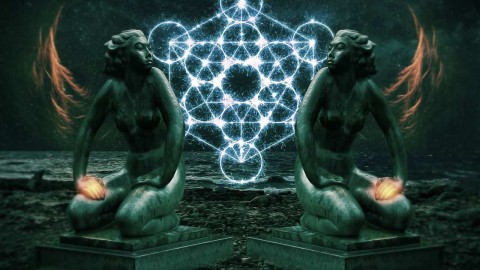I have heard that Mulla Nasrudin was learning medicine with a great physician.
He watched his master to find out hints. When the master would go for his rounds to see the patients, Mulla would follow. One day Mulla was surprised.
The master took the pulse of the patient, closed his eyes, meditated and said, “You have been eating too many mangoes.”
Mulla was surprised. How could he find out through the pulse? He never heard that anybody could find through the pulse beat: you have been eating mangoes.
He was puzzled. On the way back home he asked, “Master, please give me a little hint. How could you…?”
The master laughed; he said, “The pulse cannot show, but I looked under the bed of the patient. There were many mangoes – uneaten and a few eaten. So I just inferred; it was an inference.”
The master was ill one day, so Mulla had to go for the daily rounds. He went to see a new patient. He took the pulse in his hand, closed his eyes, brooded a little – just exactly like the master – and then he said, “You have been eating too many horses.”
The patient said, “What! Are you mad?”
Mulla was very much puzzled. He came home very disturbed and sad. The master asked, “What happened?”
He said, “I also looked under the bed. The saddle and other things were there – the horse was not there – so I thought, ‘He has eaten too many horses.’” This is how stupid mind goes on following. Don’t be stupid. Take these definitions, sayings, sutras, in a very vague way. Let them become part of your understanding, but don’t try exactly to follow them. Let them go deep in you, they become your intelligence; and then you seek your path. All great teaching is indirect.
How to attain, to this posture? How to attain this steadiness? First look at the comfort. If your body is exactly in deep comfort, in deep rest, feeling good, a certain well-being surrounds you: that should be the criterion with which to judge. That should become the touchstone. And this is possible while you are standing; this is possible while you are Lying down; this is possible while you are sitting on the ground or sitting on a chair. It is possible anywhere, because it is an inner feeling of comfort. And whenever it is attained you will not like to continue moving again and again, because the more you move, the more you will miss it. It happens in a certain state. If you move, you move away; you disturb it.
And that’s the natural desire in everybody, and yoga is the most natural thing: natural desire is to be comfortable, and whenever you are in discomfort you will like to change it. That is natural. Always listen to the natural, instinctive mechanism within you. It is almost always correct.
POSTURE IS MASTERED BY RELAXATION OF EFFORT AND MEDITATION ON THE UNLIMITED.
Beautiful words, great indicators and pointers: prayatna shaithilya – relaxation of effort – the first thing, if you want to attain to the posture, what Patanjali calls a posture: comfortable, steady, the body in such deep stillness that nothing moves, the body so comfortable that the desire to move it disappears, you start enjoying the feeling of comfort, it becomes steady.
And, with the change of your mood, the body changes; with the change of the body, your mood changes. Have you ever watched? You go to a theater, a movie: have you watched how many times you change your posture? Have you tried to correlate it? If there is something very sensational going on on the screen, you cannot sit leaning against the chair. You sit up; your spine becomes straight. If something boring is going on and you are not excited, you relax. Now your spine is no longer straight. If something very uncomfortable is going on, you go on changing your posture. If something is really beautiful there, even your eye- blinking stops; even that much movement will be a disturbance… no movement, you become completely steady, restful, as if the body has disappeared.
The first thing to attain to this posture is relaxation of effort, which is one of the most difficult things in the world – most simple, yet most difficult. Simple to attain, if you understand; very difficult to attain if you don’t understand. It is not a question of practice; it is a question of understanding.
In the West, Emile Coue has discovered a particular law he calls the law of the reverse effect. It is one of the most fundamental things in the human mind. There are things, if you want to do them, please, don’t try to do them; otherwise, reverse will be the effect.
For example, you are not falling asleep: don’t try. If you try, sleep will be farther and farther away. If you try too much it will be impossible to sleep, because every effort goes against sleep. Sleep comes only when there is no effort. When you are not bothered about sleep, you are just lying down on your pillow, just enjoying the coolness of the pillow, or the warmth of the blanket, the dark, velvety surrounding encompassing you, you are just enjoying it… nothing, you are not even thinking about sleep. Some dreams pass through the mind: you look at them in a very, very sleepy way, not interested too much even in them, because if interest arises sleep disappears. You just, somehow, remain aloof, just enjoying, resting, not seeking any end – sleep comes.
If you start trying so that sleep should come, once the “should” enters it is almost impossible. Then you can remain awake the whole night; and if you fall asleep that may be only because you get tired of the effort, and when effort is no longer there – because you have done everything and you give up – sleep comes in.
Emile Coue discovered, just in this century, the law of reverse effect. Patanjali must have known it, almost five thousand years before. He says prayatna shaithilya, relaxation of the effort. You should have assumed just the reverse: that very much effort should be made to attain, to the posture. And Patanjali says, “If you make too much effort it will not be possible. No-effort allows it to happen.”
Effort should be relaxed completely, because effort is part of the will and will is against surrender. If you try to do something, you are not allowing God to do it.
When you give up, when you say, “Okay, let thy will be done. If you are sending sleep, perfectly good. If you are not sending sleep, that too is perfectly good. I have no complaints to make; I am not grumbling about it. You know better. If it is needful, send sleep for me, send. If it is not needful, perfectly good – don’t send it. Please, don’t listen to me! Your will should be done”: this is how one relaxes effort.
Effortlessness is a great phenomenon. Once you know it, many millions of things become possible to you. Through effort, the market; through effortlessness the God. Through effort you can never reach nirvana – you can reach to New Delhi, but not to nirvana.
Through effort you can attain things of the world; they are never attained without effort, remember. So if you want to attain more riches, don’t listen to Patanjali, because then you will be very, very angry with him, that this man disturbed your whole life: “He was saying, ‘Stop making efforts, and many things will become possible,’ and I have been sitting and waiting, and the money is not coming, and nobody is coming with an invitation to ‘Come, and please, become the president of the country.’” Nobody is going to come. These foolish things are attained by effort.
If you want to become a president you have to make a mad effort for it. Unless you go completely mad you will never become a president of a country. You have to be more mad than other competitors, remember, because you are not alone there. Great competition exists; many others are trying also. In fact everybody else is trying to reach the same place. Much effort is needed. And don’t try in a gentlemanly way; otherwise you will be defeated. No gentlemanliness is needed there. Be rude, violent, aggressive. Don’t bother about what you are doing to others. Stick to your program. Even if others are killed for your power politics, let them be killed. Make everybody a ladder, a step. Go on walking on people’s heads; only then do you become a president or a prime minister. There is no other way.
The ways of the world are the ways of violence and will. If you relax, you will be thrown out; somebody will jump on you. You will be made a means. If you want to succeed in the ways of the world, never listen to people like Patanjali; then it is better to read Machiavelli, Chanakya – cunning, most cunning people of the world. They give you advice on how to exploit everybody and not allow anybody to exploit you, how to be ruthless, without any compassion, just violent. Then, only, can you reach power, prestige, money, things of the world. But if you want to attain things of God, just the opposite is needed: no-effort. Effortlessness is needed, relaxation is needed.
It has happened many times…. Osho has many friends in the world of politics, in the world of money and markets. They come to me and they say, “Teach us, somehow, to relax. We cannot relax.” A minister used to come to me, and he always came with the same problem: “I cannot relax. Help me.”
Osho told him, “If you really want to relax you will have to leave politics. This ministership cannot go with relaxation. If you relax, you lose. So you decide. I can teach you relaxation, but don’t be angry then, because these two things cannot be possible together. So first be finished with your politics; then come to me.”
He said, “That is not possible. I have come to learn relaxation so that I can work hard and become chief minister. Because of these tensions in the mind and continuous worries, I cannot work hard. And others – they go on working. They are great competitors, and I am losing the battle. I have not come to leave politics.”
Then Osho said, “Then, please, don’t come to me. Forget about me. Just be in politics, get really tired, bored, be finished with it; then come to me.” Relaxation is a totally different dimension, just the contrary.
You move in the world with will. Nietzsche has written a book, THE WILL TO POWER. That is the right scripture to read: THE WILL TO POWER. Patanjali is not “will to power”; it is surrender to the whole. The first thing: prayatna shaithilya – effortlessness. You should simply feel comfortable. Don’t make much effort about it; let the feeling do the work. Don’t bring the will in. How can you force comfort on yourself? It is impossible. You can be comfortable if you allow comfort to happen. You cannot force it.
How can you force love? If you don’t love a person, you don’t love a person.
What can you do? You can try, pretend, force yourself, but just the reverse will be the result: if you try to love a person you will hate him more. The only result will be, after your efforts, that you will hate the person, because you will take revenge. You will say, “What type of ugly person is he, because I am trying so much to love and nothing happens?” You will make him responsible. You will make him feel guilty, as if he is doing something. He is not doing something.
Love cannot be willed, prayer cannot be willed, posture cannot be willed. You have to feel. Feeling is a totally different thing than willing.
Buddha becomes a Buddha not by will. He tried for six years continuously through will. He was a man of the world, trained as a prince, trained to become a king of a kingdom. He must have been taught all that Chanakya had said.
Chanakya is the Indian Machiavelli, and even a little more cunning than Machiavelli because Indians have a quality of mind to go to the very roots. If they become Buddha they really become Buddha. If they become Chanakya you cannot compete with them. Wherever they go they go to the very root. Even Machiavelli is a little immature before Chanakya. Chanakya is absolute.
Buddha must have been taught; every prince has to be taught – Machiavelli’s greatest book’s name is THE PRINCE. He must have been taught all the ways of the world; he was to tackle people in the world. He has to cling to his power. And then he left. But it is easy to leave the palace; it is easy to leave the kingdom. It is difficult to leave the training of the mind.
For six years he tried through the will to attain to God. He did whatsoever is humanly possible – even inhumanly possible. He did everything; he left nothing undone. Nothing happened. The more he tried, the more he felt himself far away. In fact the more he made the will and the efforts through it, the more he felt that he was deserted – “God is nowhere.” Nothing was happening.
Then one evening he gave up. That very night he became enlightened. That very night prayatna shaithilya, relaxation of the effort, happened. He became a Buddha not by willpower, he became a Buddha when he surrendered, when he gave up.
Osho teach you meditations and he go on telling you, “Make every effort that you can make,” but always remember, this emphasis to make all the efforts is just so that your will is torn apart, so that your will is finished and the dream with the will is finished: you are so fed up with will that one day, you simply give up. That very day you become enlightened.
But don’t be in a hurry, because you can give up right now without making the effort – that will not help. That won’t help. That will be a cunning thing, and you cannot win with God by being cunning. You have to be very innocent. The thing has to happen.
These are simply definitions. Patanjali is not saying, “Do it!” He is simply defining the path. If you understand it, it will start affecting you, your way, your being. Absorb it. Let it be saturated deep in you. Let it flow with your blood. Let it become your very marrow. That’s all. Forget Patanjali. These sutras are not to be crammed. They should not be made part of your memory; they should become part of you. Your total being should have the understanding, that’s all.
Then forget about them. They start functioning.
“Posture is mastered by relaxation of effort and meditation on the unlimited.”
Two points. Relax effort: don’t force it, allow it to happen. It is like sleep; allow it to happen. It is a deep let-go; allow it to happen. Don’t try to force it; otherwise you will kill it. And the second thing is: while the body is allowing itself to be comfortable, to settle in a deep rest, your mind should be focused on the unlimited.
The mind is very clever with the limited. If you think about money, the mind is clever; if you think about power, politics, mind is clever; if you think about words, philosophies, systems, beliefs, mind is clever – these are all limited. If you think about God, suddenly a vacuum…. What can you think about God? If you can think, then that God is no longer God; it has become limited. If you can think of God as Krishna, it is no longer God; then Krishna may be standing there singing on his flute, but there is a limitation. If you think of God as Christ – finished. God is no longer there; you have made a limited being out of it.
Beautiful, but nothing to be compared with the beauty of the unlimited.
There are two types of God. One, the God of belief: Christian God, Hindu God, Mohammedan God. And the God of reality, not of belief: that is unlimited. If you think about the Mohammedan God you will be a Mohammedan, but not a religious man. If you think about the Christian God you will be a Christian, but not a religious man. If you just bring your mind to God himself you will be religious – no longer Hindu, no longer Mohammedan, no longer Christian.
And that God is not a concept! A concept is a toy your mind can play with. The real God is so vast… God plays with your mind, not your mind playing with God. Then God is no longer a toy in your hands; you are a toy in the hands of the divine. The whole thing has totally changed. Now you are no longer controlling – you are no longer in control: God has taken possession of you. The right word is “to be possessed,” to be possessed by the infinite.
It is no longer a picture before your mind’s eye. No, there is no picture. Vast emptiness… and in that vast emptiness you are dissolving. Not only God’s definition is lost, boundaries are lost; when you come in contact with the infinite you start losing your boundaries. Your boundaries become vague. Your boundaries become less and less certain, more flexible; you are disappearing like smoke in the sky. A moment comes, you look at yourself… you are not there.
So Patanjali says two things: no effort, and consciousness focused on the infinite.
That’s how you attain asan. And this is only the beginning; this is only the body. One has to go deeper.
Tato dwandwa anabhighatah.
Tags: Patanjali Yoga Sutra 29 Relax Effort










